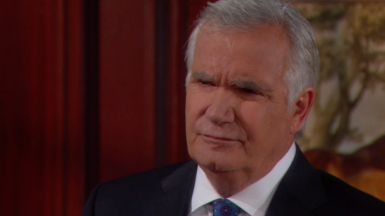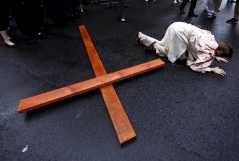
Did you ever play the game of Mercy as a kid? You twist each other's fingers and bend them back until someone cries out for mercy or surrenders. Of course, if you surrendered you'd lost the game.
In that game, and in most of life, surrender is seen as a bad thing. Conversely, surrendering to God can be one of the best and most important things we could ever do. Most of us don't do it willingly. But when we're in times when we feel like we've been pushed far beyond the limits of what we thought we could cope with, we come to the end of ourselves and finally let go.
We feel broken and that brokenness allows us to admit something most of us have always known but never really like to face: we don't have it all together. We don't have what it takes to go through life with a permanent smile on our face. We don't have the answers to every problem.
But God doesn't expect us to sort things out on our own. How much time do we waste trying to resolve things in our own strength before we realise we need to go to him? How long does it take us to realise the truth of William Booth's words that "The greatness of a man's power is the measure of his surrender"?
In Gethsemane, Jesus gave us the most amazing example of surrender. It always astounds me to see how he was able to open his heart in complete honesty before his father, asking for an alternate plan. The writers of the gospels knew it was vital to include this prayer. They didn't feel the need to paint a picture of a saviour who faced the cross without fear.

As we read the Gospel accounts we catch a glimpse of some of the emotional and mental challenges Jesus was going through. He entered the garden and went to pray as he had done many times before, but this was no ordinary night. He was deeply troubled and distressed (Mark 14: 33) and experts tell us the Greek verb for troubled is "to be overcome with horror".
What Jesus was facing was beyond physical torment. He knew his body faced agony, but his soul faced worse as he would soon be separated from his father. In verse 35 we read that he fell to the ground. People used to stand to pray, lifting up their hands towards heaven, but in times of severe distress they would lie flat on the ground, as King David did when his child was about to die (2 Samuel 12:16).
Jesus' words in Gethsemane are well known. He cried out: "Abba, father, anything is possible for you, take this cup from me." Using the affectionate Arabic term for father, he asked if there were any other way for their mission to be accomplished. His prayer was not answered with the 'Yes' that we assume he wanted. The cup of suffering was not taken away. There was no way around the cross.
Despite his extreme distress that caused him to sweat blood, Jesus found a way to surrender. He said, "Yet not what I will but what you will" (verse 36). He chose to trust his father amid his pain, anxiety and emotional exhaustion. He chose his father's way over his own, showing the true nature of surrender.
Far from being a moment of weakness, that shows an incredible courage and strength. I'm always amazed that Jesus managed to pray this prayer and its words have been echoed by many Christians since. None of us can pray it lightly and most of us prefer to pray for God's will to match up with ours instead. Praying "Your will be done" means we're out of control. We're saying that we aren't choosing our own path, we're not going to go our own way but instead we're going to trust in our heavenly Father, come what may.
For Jesus this meant suffering the agonising pain of the cross and separation from his father. For us it means surrendering to things we don't always understand, following Jesus' example, resting in God's love, admitting our brokenness and allowing him to hold us together in his love.
Patrick Regan is the chief executive of youth charity XLP. His book, When Faith Gets Shaken (Lion Hudson), is out now. whenfaithgetsshaken.com




















